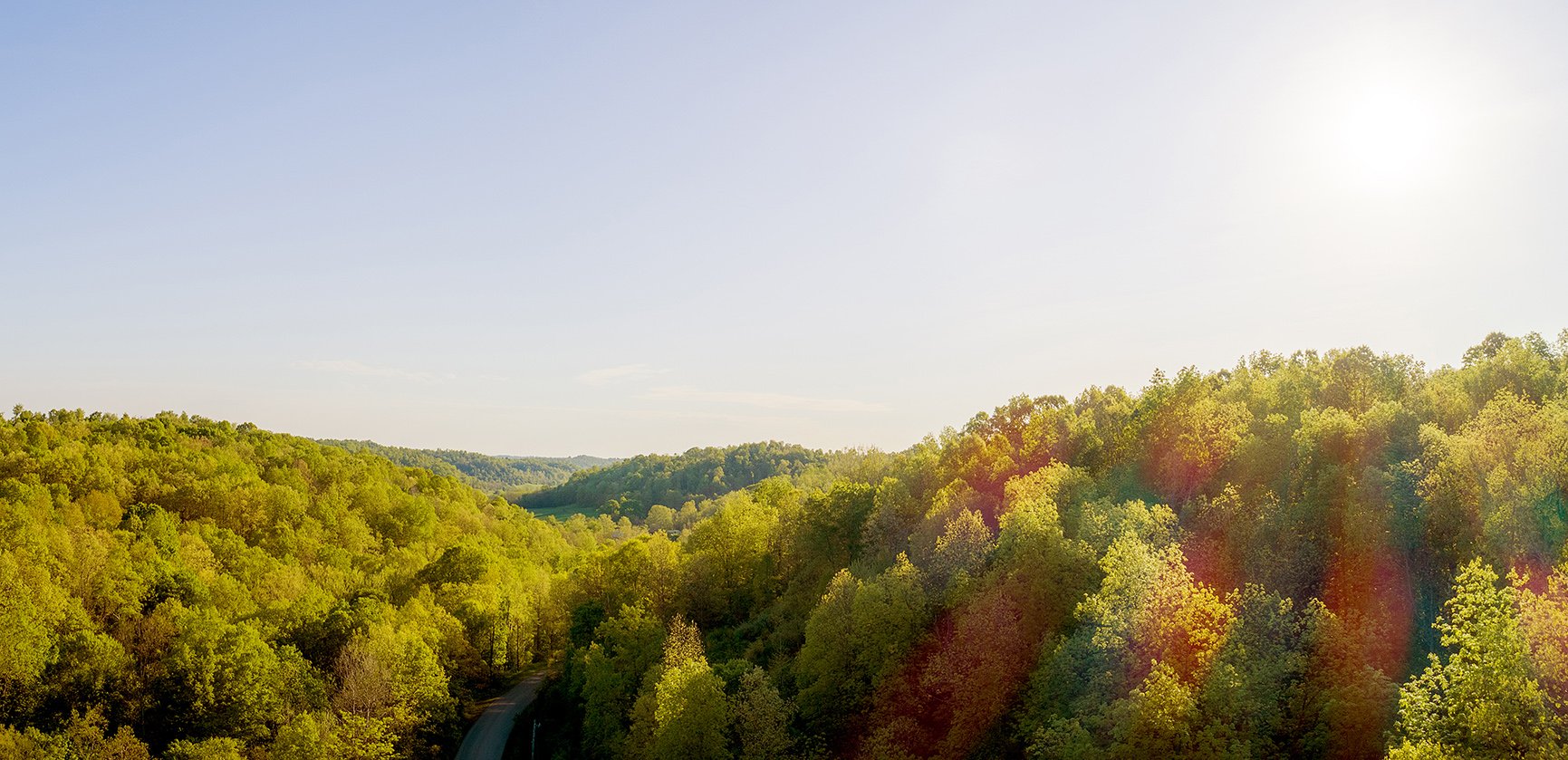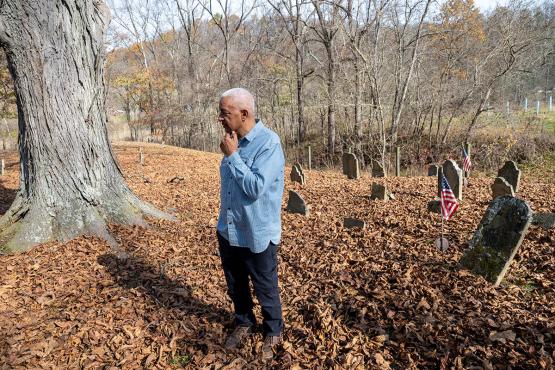Athens County Breakdown
Just outside of the tiny village of Amesville, which
The children of pioneers who’d crossed the Ohio River
From Virginia had settled in spite of its poor drainage
More than a century before, sat that big square house
That Will Dewees rented out to classmates of ours
While he was on leave from his job at the university —
Jerry and Deb in a room upstairs, Linda and her daughter
In another, Jim downstairs, and Donny in the cabin out back.
With its detached summer kitchen, its limestone foundation,
Its faded grandeur, and its setting on the creek,
Connected to the road by a bridge of tied logs,
It reminded me a lot of a Yoknapatawpha County setting
In a short story or novel by the inimitable William Faulkner—
Major de Spain’s place in “Barn Burning,” say, featuring
The notorious Abner Snopes, the antebellum house built
By Thomas Sutpen in Absalom, Absalom!, or the doomed abode
Of the Compson family in The Sound and the Fury.
At least it did later—after I’d actually read that stuff.
Our shelter, though, the makeshift one that Phil and I shared,
Just a shack, really, a cheap box of aluminum sheets
From the lithographic print shop of the Columbus Dispatch
That Will and friends had learned to nail to two-by-fours
On a volunteer project they’d done in East Africa
To make perfectly serviceable, if temporary, lodgings,
On the slope of a ridge overlooking the fallow field
That filled a narrow flood plain between a parallel ridge
And ours, was set back another one hundred yards or so
From the gravel road and the creek that ran along it.
The silver rectangular sheets of aluminum on the wall
Still bore headlines from past editions of the paper
That we could read again, hanging out at our only table
With a view of the field through the Plexiglass window—
Not news we might have read back in the 1860s
About the rippled region across that great river
Seceding from the Secessionists and becoming West Virginia
On the grounds that they had poor agriculture, no
Aristocracy to speak of, and nothing to gain from slavery,
But news from the turbulent late 1960s
And the early 1970s that now were fresh history.
Johnson’s decision, in light of the opposition
To his program in Vietnam, not to run for President again;
Nixon and Kissinger’s infamous Christmas Day surprise
Bombing of Cambodia; the Manson Family massacre
Of Hollywood celebrities. Traffic accidents. Box scores.
And endless reports on the Watergate hearings.
Not that we ever did that, really—except for momentary
Amusement as we swilled our Rolling Rock beer
Or sipped from ceramic mugs our weak Folgers coffee.
*
Not having met him more than once or twice, I don’t know
How it was for Will, growing up in the 40s and 50s
In the suburbs of Chicago, according to his obituary,
And returning from service in international development,
To go back to the land like that, and to start himself both
An intentional community and a daffodil business—
Nor, for that matter, how it was for Jerry and Deb,
He from Dayton and she from a suburb of Boston,
Lusty young lovers who had each other for breakfast;
For countercultural blue-collar mountain mama Linda
And her barefoot daughter running around in her underwear;
For tall and slender Jim, the keeper of egg-laying geese
Who was particularly fond of Jesse Colin Young’s song
“Hippie from Olema,” a send-up of the Merle Haggard tune
That begins, “I’m proud to be an Okie from Muskogee”;
And for Donny in the cabin at the head of the holler,
Determined, like Jim, to go to law school to defend us
Against the wily capitalists who’ve since taken over.
But for a flatlander like me from a white bread suburb
On the outskirts of Columbus, grandson to natives
Of Old McDonald farms and German Village bakeries, son
Of sheet-metal fabricator and pink-collar worker,
It was a rare thrill to live out there, on the rustic backroads
Of rural Amesville, especially in that improvised shack
On the side of even the most utterly insignificant hill
With loyal friend Phil—the curious and capable son
Of an architect and a doctor from a suburb of Cleveland.
I loved that it was built on four stilts of two-by-fours,
And that a brook trickled beneath it on its way downhill,
In ironic homage to Frank Lloyd Wright’s Falling Water.
With no telephone or plumbing, with natural gas siphoned
From an oil claim on the property, and with electricity run,
Illegally, by buried wire from the main house on the road,
Where we had access to the toilet and the shower,
That place put me closer than ever to the weather.
*
Sometimes, climbing to the ridge top, following the creek
Beyond Donny’s cabin, which he, Phil, and classmates
In a Foxfire program had moved to the holler,
Or throwing sticks for my dog between the barn and the house,
I wondered whether, like certain iconic figures
Of eastern religious legend, I could dissolve myself in nature
And immerse my consciousness so selflessly in the imagery
That, for all intents and purposes, my identity would disappear,
Or at least the reprehensible aspects of my character.
At other times, living in the boonies of Athens County
Was enough to drive me to write the kind of poetry
That those same ethereal luminaries might have written
As concession and consolation when the revelation failed
And they needed to do something quick to get it back.
Not the poems lamenting an unrequited infatuation,
Comparing greater Columbus to a gigantic ant colony,
And worrying about the environmental implications
Of my black VW bug, but those I recorded in my journal
When a male cardinal, flying across the stubble
Of that fallow field in fall, showed off its scarlet crest,
When an ice-white blizzard huffed and puffed and tried
To blow the flimsy shack down, when mayflower and dogwood
Bloomed in the woods, and when the creek rose so high
With cold spring rain that it flooded the shallow valley,
Washing out our bridge, scattering its skinned logs,
Stranding cars, tractors, and trucks, and clogging for a week
The village’s one commercial block with brush and dead dogs.
VIDEO: Produced by Kelee Garrison Riesbeck, BSJ, CERT '91. Video production by Clinton Amand, BSC '12, MA '18, and Max Catalano, BSVC '20.
FEATURE PHOTO: A bird’s eye view of the Amesville landscape. The village received its first settler in 1797, was laid out in 1837, and was home to an estimated 157 Athens Countians in 2017. Photo by Ben Wirtz Siegel, BSVC ’02.






